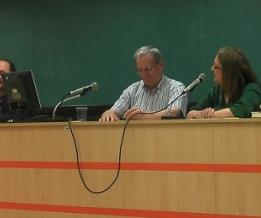scientific diffusion Seminars and Agenda Future of democracies by Philippe Schmitter
Future of democracies by Philippe Schmitter
Philippe Schmitter is emeritus professor of European University Institute (Florence) and has taught at the University of Chicago, Stanford and Zurich among others. He has several publications on regional integration, democracy and representative institutions and political processes in Latin America. More information about its history and selected bibliography here
The activity is open to interested parties, without prior registration.
Important
The Special Seminar with Philippe Schmitter will be transmitted over the Internet.
To watch you must follow these steps:
1 - Go to: www.iptv.usp.br
2 - Click on broadcasting.
3 - Click on Live
4 - Click the Banner or event name "Future of Democracies."
It requires Media Player installed
POST-EVENT
The award-winning scholar and researcher Philippe Schmitter, professor emeritus at the European University Institute (Florence), addressed the topic “Future of Real Existing Democracies.” focusing especially on European countries. Referring to the work of Robert Alan Dahl, Schmitter pointed out that the forms of government called polyarchies (which currently number 26, though it's possible to observe between 80 and 90 so-called democracies) and the fact that democracies are in expansion. He made an exception, however, about the countries that call themselves democracies and seeking to imitate the polyarchies (Western parliamentary democracies), although not having all of their features. He mentioned the relationship of elements present in democracies in terms of being polyarchies, and highlighted that only Denmark and Switzerland do not incorporate all of these points. He stressed that citizenship and inequality would be key elements in defining the best type of democracy. In his presentation, the professor launched a retrospective look at the evolution of the democratic regime, in the face of various processes within the states.
He also covered the work that develops the Council of Europe, the European Court, and his analysis related to the elections in the European Union, with this approach and 20-year projection.
The talk also addressed the topic of institutional complementarity as a way to distinguish capitalist systems, in order to observe characteristics such as the role of government, corporate governance, decentralization, role of stock exchanges, the credit system, etc.
His presentation included some suggestions that he developed to enhance democracy, in view of the reality of certain European countries where there is the habit of voting among the oldest, with absenteeism among the young, which reveals the dramatic collapse in the transmission of values between generations.




